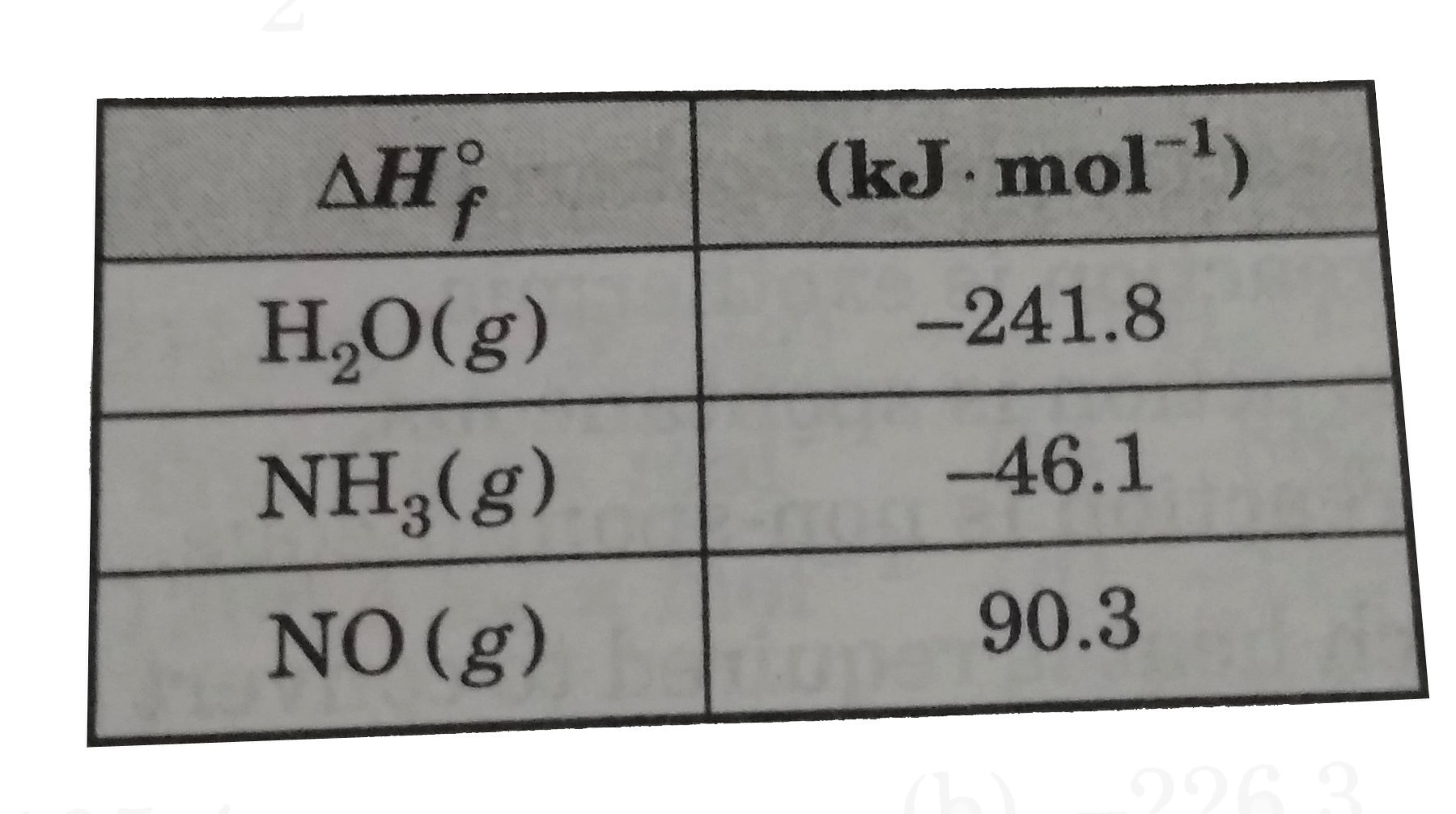Determine for the reaction in KJ .

The correct Answer is:c
Step by step video, text & image solution for Determine DeltaH_(rxn) for the reaction in KJ .mol^(-1) 2NH_(3)(g)+(5)/(2)O_(2)(g)to2NO(g)+3H_(2)O(g). by Chemistry experts to help you in doubts & scoring excellent marks in Class 11 exams.
Updated on:21/07/2023Topper's Solved these Questions
Similar Questions
Diborane is a potential rocket fuel which undergoes combustion according to the reaction:
B2H6(g)+3O2(g)→B2O3(s)+3H2O(g)
From the following data, calculate the enthalpy change for the combustion of diborane.
2B(s)+32O2(g)→B2O3(s)ΔH=−1273kJmol−1
H2(g)+12O2(g)→H2O(l)ΔH=−286kJmol−1
H2O(l)→H2O(g)ΔH=44kJmol−1
2B(s)+3H2(g)→B2H6(g)ΔH=36kJmol−1.
View SolutionGiven
N2(g)+3H2(g)⇔2NH3(g),K1
N2(g)+O2(g)⇔2NO(g),K2
H2(g)+12O2(g)⇔H2O(g),K3
The equilibrium constant for
2NH3(g)+52O2(g)⇔2NO(g)+3H2O(g)
will be
View Solution
Knowledge Check
Use the information in the table to calculate the enthalpy of this reaction .
C2H6(g)+72O2(g)→2CO2(g)+3H2O(l)
ReactionΔH∘fKJ.mol−12C(s)+3H2(g)→C2H6(g)−84.72C(s)+O2(g)→CO2(g)−393.5H2(g)+12O2(g)→H2O(l)−285.8A−764KJB−1560KJC−1664KJD−3120KJUse the thermochemical data given to calculate Δh∘f for N2O5(g) in KJ/mol−1
N2(g)+O2(g)→2NO(g)ΔH∘=+180.5KJ
2NO(g)+O2(g)→2NO2(g)ΔH∘=−114.1Kj
4NO2(g)+O2(g)→2N2O5ΔH∘=−110.2KjA−332.8B−43.8C11.3D22.6From the following data at 25∘C
ReactionΔrH∘kJ/mol12H2(g)+12O2(g)→OH(g)42H2(g)+12O2(g)→H2O(g)−242H2(g)→2H(g)436O2(g)→2O(g)495
Which of the following statement(s) is/are correct : Statement(a) : ΔrH∘ for the reaction H2O(g)→2H(g)+O(g) is 925 kJ/mol
Statement (b) : ΔrH∘ for the reaction OH(g)→H2(g)+O(g) is 502 kJ/mol
Statement(c) : Enthalpy of formation of H(g) is – 218 kJ/mol
Statement(d) : Enthalpy of formation of OH(g) is 42 kJ/molAStatement cBStatement a, b, dCStatement b,cDStatement a, d
If the reaction of 1.0 mol NH3(g) and 1.0 mol O2(g)4NH3(g)+5O2(g)→4NO(g)+6H2O(l) is carried to completion, then
View SolutionThe ΔH∘f for CO2(g), CO(g) and H2O(g) are −395.5,−110.5 and −241.8 kJmol−1 respectively. The standard enthalpy change in (in kJ) for the reaction
CO2(g)+H2(g)→CO(g)+H2O(g) is
View Solutionthe ΔH∘tforCO2(g),CO(g)andH2O(g)are−393.5,−110.5and−241.8kJmol−1 respectively, the standed enthalpy change ( in kJ) for the reaction
CO2(g)+H2(g)→CO(g)+H2O(g) is
View SolutionThe ΔH∘t for CO2(g), CO(g) and H2O (g) are −393.5,−110.5 and −241.8kJmol−1 respectively. The standard enthalpy change (in kJ) for the reaction.
CO2(g)+H2(g)→CO(g)+H2O(g) is
View SolutionΔH∘t for CO2(g) and H2O(g) are −393.5,−110.5 and −241.8kJmol−1 respectively. The standard enthalpy change (in kJ) for the reaction.
CO2(g)+H2(g)→CO(g)+H2O(g) is:
View Solution
